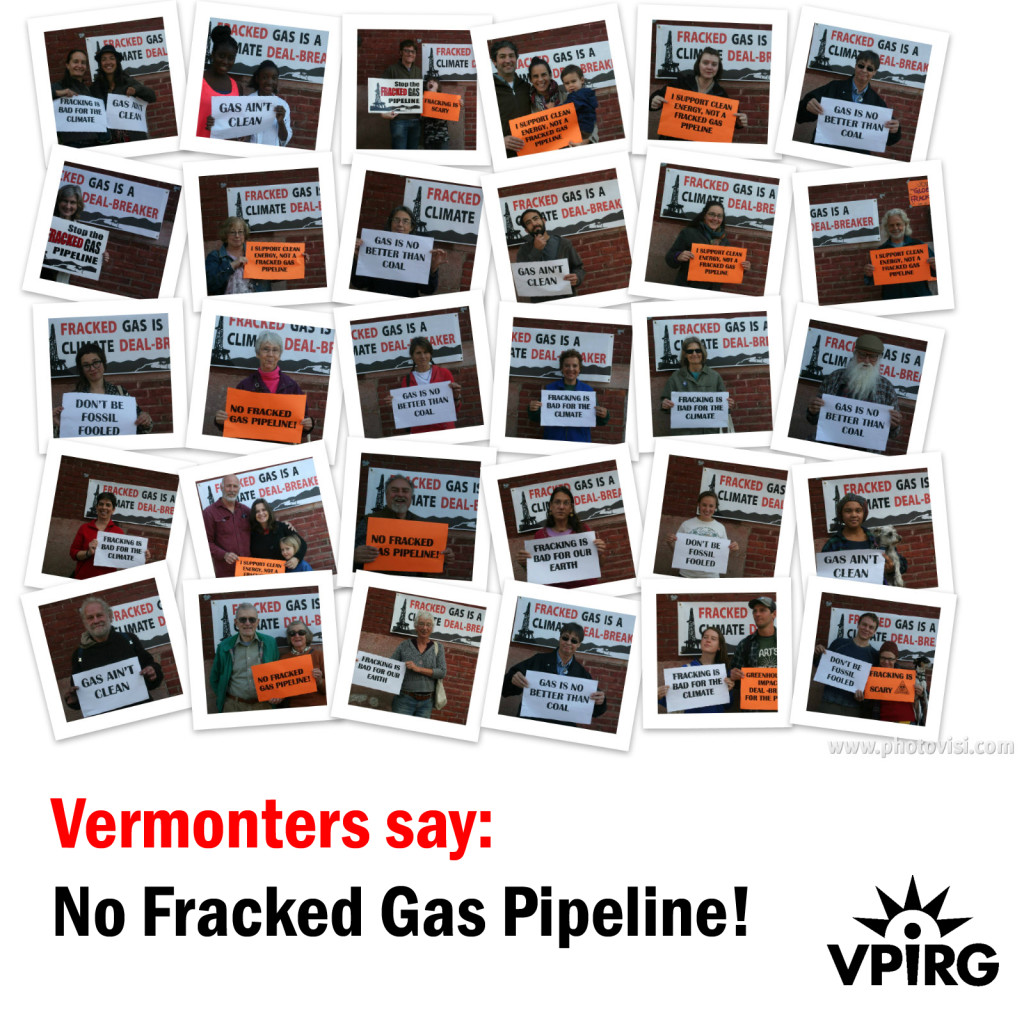350Vermont • Citizens Awareness Network • Conservation Law Foundation • Rising Tide Vermont • Sierra Club Vermont Chapter • Toxics Action Center • Vermont Citizens for the Public Good • Vermont Natural Resources Council • Vermont Public Interest Research Group
MEDIA RELEASE
Montpelier, VT — Siding with the overwhelming majority of public comments submitted to the Vermont Public Service Board (PSB), many of the state’s leading environmental groups announced today that they too oppose a Certificate of Public Good (CPG) for the proposed fracked gas pipeline extension.
To date, the public has submitted roughly 2,000 comments to the PSB about the controversial Vermont Gas Systems (VGS) proposal to build new pipeline infrastructure through Addison County. A careful review by the Vermont Public Interest Research Group (VPIRG) found more than 96 percent of the comments submitted so far were from Vermonters opposed to the plan.
“Vermonters are right to be concerned about the dangers of fracking and the threat that a massive, new fossil fuel pipeline poses to our state’s clean energy future,” said Paul Burns, executive director of VPIRG. “It would far better for Vermont’s environment and economy to make our homes and businesses more energy efficient and use more renewable energy for our heating needs.”
At least 1,200 of the submitted public comments urge the PSB deny a CPG because new fracked gas pipeline infrastructure could significantly increase our state’s global warming footprint. Fracked gas is made mostly of methane which, pound for pound, has 86 times the heat-trapping power of carbon 20-year period.¹
The groups pointed out that when expert witnesses told the Public Service Board that Phase I would increase emissions by as much as 4.3 million tons of global warming pollution – because of how much “fugitive” methane is released during the drilling, processing, and transport of the gas – that calculation was based on older IPCC estimates that were revised upward in September. In short, based on the most recent, comprehensive science, the climate impact of the pipeline will be more severe than previously thought.
“At a time when climate change demands we do everything we can to move away from fossil fuels, building a new gas pipeline in Vermont moves us in exactly the wrong direction,” said Sandra Levine, Senior Attorney with the Conservation Law Foundation. “As proposed, the Vermont Gas project locks in Vermont’s dependence on dirty fossil fuels for decades, increases greenhouse gas emissions, and should not be approved.”
According to the Vermont Gas website, much of the gas it sells is extracted using the controversial drilling practice known as “fracking.” The 82,000 fracking wells that have been drilled in the U.S. since 2005 have required the use of at least 280 billion gallons of water and at least 2 billion gallons of chemicals, many of which are toxic.² ³ Often laced with cancer-causing and even radioactive material, toxic fracking waste has contaminated drinking water sources from Pennsylvania to New Mexico.
“To put it in perspective, today Wyoming’s air quality is often worse than that of Los Angeles, due to gas development,” said Naomi Leary, organizer with Toxics Action Center. “If fracking is too dirty, dangerous and costly for Vermont, then we shouldn’t pretend that it’s suddenly any less of a toxic, environmental nightmare just because we’re not living and breathing it ourselves.”
“There is not an iota of public good in this fracked gas pipeline, not for Vermonters nor the frontline communities whose water and land will be forever tarnished by fracking operations,” said Maeve McBride, organizer for 350VT. “We are in a climate crisis that requires a swift shift from fossil fuels to renewables and significant conservation of energy.”
The Vermont Natural Resources Council’s Johanna Miller pointed out that compared to the clean, local and affordable options available today, fracked gas is among the most risky, environmentally damaging, and costly ways to heat Vermont homes. “Efficiency and renewable technologies like geothermal, heat pumps, and sustainably harvested wood are already saving Vermonters money and cutting Vermont’s contribution to climate change,” said Miller. “Choosing efficiency and clean energy over more fracked gas is just simply a win-win.”
“The Vermont Sierra Club strongly opposes this proposed gas line. It makes no sense to add fossil fuel infrastructure, especially when it will transport gas obtained by fracking, at a time when the state, nation, and the entire international community should be headed in exactly the opposite direction,” said Charles McKenna, chair of the Vermont Sierra Club. “Instead of increasing our reliance on a process outlawed in Vermont for good reason, we should be investing in a carbon-free renewable energy system, reducing our carbon emissions as quickly as possible to meet or exceed our goal of 90% renewable energy by 2050.”
“From every corner of Vermont, we’ve seen community members stand together, united in opposition to this extreme energy project,” said Sara Mehalick, with Rising Tide Vermont.
VGS has said that it plans to file for a permit for Phase II of the gas project as soon as tomorrow, November 19th, despite the fact that no decision has been made regarding Phase I yet.
“Vermont Gas seems to be taking it for granted that their fracked gas pipeline will be approved. But given the growing number of people and organizations stepping up to oppose the project, and the strong objections they are raising, this is a gamble that the Board should reject,” said VPIRG’s Burns.
Sources
[1] United Nations IPCC Fifth Assessment Report, Working Group I (September 2013).
[2] Environment America Research and Policy Center, Fracking By the Numbers, (October 2013)
[3] New York City Department of Environmental Conservation, Impact Assessment of Natural Gas Production in the New York City Water Supply Watershed (December 2009).
###

